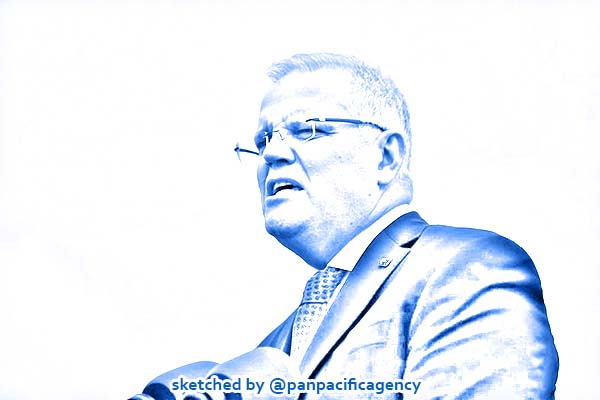Australia’s first interest rate rise in 12 years shakes up election campaign

Australian Prime Minister Scott Morrison speaks during a joint press conference held with New Zealand Prime Minister Jacinda Ardern. Photo: Reuters. Sketched by the Pan Pacific Agency.
SYDNEY, May 4, 2022, ST. Australia’s central bank lifted interest rates on Tuesday (May 3) for the first time in 12 years – a move that instantly reshaped the federal election and dealt a blow to Prime Minister Scott Morrison, who has campaigned on his ability to address cost of living concerns, The Straits Times reported.
Facing spiralling inflation, the Reserve Bank of Australia (RBA) raised the nation’s record low interest rates of 0.1 per cent to 0.35 per cent.
The increase was higher than expected and signalled the bank’s growing concerns about the annual inflation rate of 5.1 per cent, which is the highest since 2001 and is set to keep rising.
RBA governor Philip Lowe signalled that interest rates could lift over time to 2.5 per cent – a move that would leave many of Australia’s heavily indebted property owners struggling to repay their home loans.
“The (RBA’s) board is committed to doing what is necessary to ensure that inflation in Australia returns to target over time,” Dr Lowe said in a statement.
“This will require a further lift in interest rates over the period ahead.”
But the interest rate hike comes at a perilous time for the ruling Liberal-National Coalition, which has campaigned on its economic credentials.
The last time the RBA raised interest rates during an election campaign was in 2007 – a move that was credited with helping Labor leader Kevin Rudd to defeat then Prime Minister John Howard.
Following the bank’s announcement on Tuesday, the Labor opposition seized on the news to launch a fierce attack on Mr Morrison.
Labor’s shadow treasurer, Dr Jim Chalmers, accused Mr Morrison of causing a “full-blown cost-of-living crisis”.
“Scott Morrison’s economic credibility was already tattered and now it is completely shredded,” he told reporters.
“All we’re left with are skyrocketing inflation, rising interest rates, falling consumer confidence and falling real wages.”
Australia’s economy has recovered strongly since the onset of the pandemic, when it experienced its first recession in almost 30 years. The unemployment rate is 4 per cent – the lowest level in 48 years – and wages have begun to rise.
But surging property prices, buoyed by government handouts and tax breaks for buyers, have left home owners worryingly vulnerable to interest rate rises.
Mr Morrison, who has been prime minister since 2018, defended his economic record on Tuesday, saying that the rate rise reflected the strength of Australia’s recovery.
He said the economy was performing better than other advanced economies, noting that the inflation rate in the United States was more than 8 per cent.
“The situation Australia faces is a situation faced all around the world,” he said.
“I sympathise with Australians as they face high cost-of-living pressures. I sympathise with Australians when they face higher repayments on their homes.”
Opinion polls this week showed Labor continues to hold a strong lead over the Coalition and is on track to win the election on May 21.
The Coalition is typically seen as stronger at managing the economy and prefers to campaign on economic issues, while Labor prefers to campaign on issues such as health, education and climate change.
But the interest rate decision has ensured that the economy will be a central focus of the remaining days before the election, though this may not benefit the Coalition.
Melbourne home owner Alan Maassen told ABC News on Tuesday he had an A$700,000 (S$688,800) mortgage and was deeply concerned about the prospect of interest rates rising to 2 per cent or more.
“Is it just a matter of time before I can’t afford to own my own home?” he asked.
AMP chief economist Shane Oliver said Australia’s inflation rate is lower than that in the United States, Europe, Canada and New Zealand but is “following the other countries higher”.
“Waiting till after the election (to increase interest rates) would have left the RBA vulnerable to criticism that it was influenced politically, which could call into question its independence and further dent its credibility,” he said in a statement.
Analysts expect the RBA to increase interest rates again in June and to lift the rate to 1.5 per cent by the end of the year.